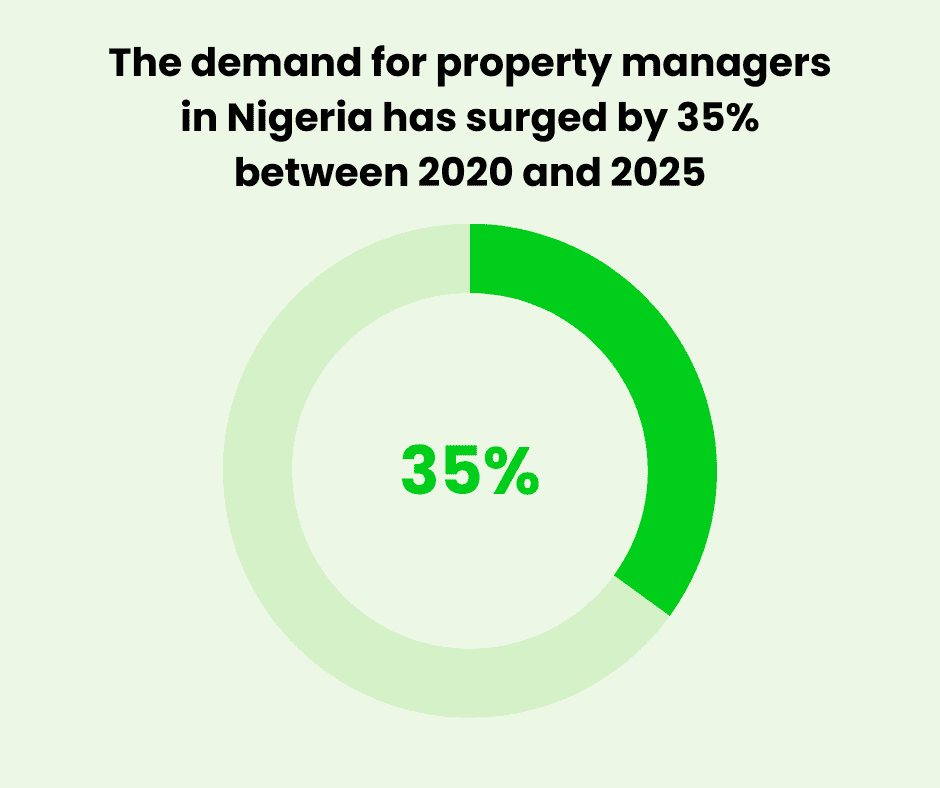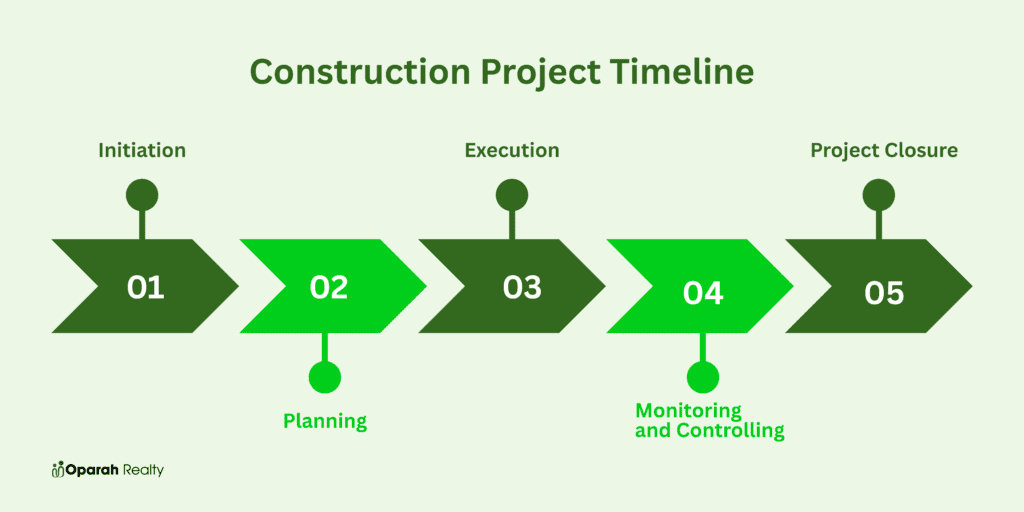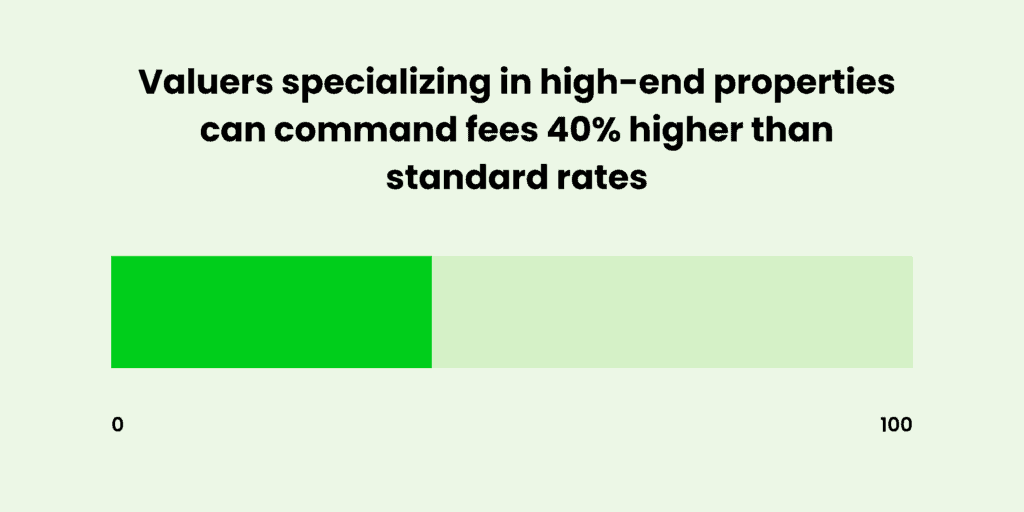- Home
- Real Estate Agent
- Real Estate Careers & Their Designations
Real Estate Careers and Their Designations in Nigeria

by Bright Ugochukwu
Last Updated: Apr 11, 2025
The Nigerian real estate sector is thriving, and this boom offers many opportunities for professionals who are ready to succeed.
This guide helps you explore different roles in the industry.
Whether considering a career change or wanting to learn more, you’ll find details on responsibilities, earning potential, and paths to success.
What Are the Real Estate Careers in Nigeria?
Here are some of the real estate careers and their designations in Nigeria.
- Real Estate Investor
- Real Estate Broker
- Real Estate Agent
- Property Manager
- Surveyor
- Real Estate Attorney
- Real Estate Developer
- Estate Appraiser/Valuer
1. Real Estate Investor
The real estate market in Nigeria is on an upward trajectory. Projections estimate its value will reach US$2.61 trillion by 2025.

Investors’ earnings vary based on portfolio size and strategy. Some may earn between ₦5 million and ₦50 million annually. However, top-tier investors can earn over ₦100 million.
Major cities like Lagos, Abuja, and Port Harcourt are prime locations due to their rapid urbanization and economic activities.
| Metric | Value |
|---|---|
| 5-Year Industry Growth | 28% |
| Average Earnings | ₦5M–₦50M+ annually |
| Top 10% Earnings | ₦100M+ annually |
Table 1: Earnings Potential and Industry Growth for Real Estate Investors
Primary Duties
- Identifying Profitable Properties: Conducting thorough market research to find properties with high appreciation potential.
- Raising Capital: Securing funds through personal savings, loans, or partnerships to finance acquisitions.
- Risk Management: Assessing and mitigating potential risks to ensure optimal returns on investment.
Key Qualifications
- Financial Literacy: Understanding financial principles to make informed investment decisions.
- Market Analysis Skills: Analyzing market trends and data to forecast property performance.
- Networking Ability: Building relationships with industry professionals to access prime opportunities.
2. Real Estate Broker
The brokerage segment is experiencing significant expansion. Analysts project that the real estate market will reach US$2.61 trillion by 2025.
Brokers earn standard commissions of 10% to 15% per transaction, often shared with agents. Top performers, especially in the luxury markets of Lagos and Abuja, can earn between ₦1 million and ₦10 million+ monthly.

Brokerage models traditionally involve a 60-70% commission split with agents. However, a growing model in the mid-market segment offers fixed service fees.
For market hotspots, areas like Victoria Island, Ikoyi, and Lekki in Lagos are prime locations. Similarly, the capital city of Abuja has highly sought-after neighbourhoods such as Maitama and Asokoro.
| Metric | Value |
|---|---|
| 5-Year Industry Growth | 67% |
| Standard Commission | 10–15% per transaction |
| Top Performers' Earnings | ₦1M–₦10M+ monthly (Lagos/Abuja luxury market) |
Table 2: Earnings and Industry Growth for Real Estate Brokers
Licensing Requirements
- ESVARBON/NIESV Certification: Mandatory certifications for practicing brokers in Nigeria.
- Experience: A minimum of 3 years as a licensed agent before qualifying as a broker.
Core Responsibilities
- Overseeing Agent Teams: Managing and mentoring a team of agents to achieve sales targets.
- Managing Agency Operations: Ensuring smooth day-to-day operations of the brokerage firm.
- Securing High-Value Listings: Acquiring premium property listings to boost the firm’s portfolio.
Key Skills
- Advanced Negotiation: Expertise in closing high-stakes deals.
- Lead Generation: The ability to attract and retain potential clients.
- Legal Compliance: Ensuring all transactions adhere to regulations, including PRODA laws.
Tech Stack
- CRM Systems: Tools like KvCore and LionDesk for client relationship management.
- Listing Tools: Utilize platforms like PropertyPro API and Oparah Realty for property listings.
Notable Trends in Nigeria
- Regulation Shift: New 2024 ESVARBON rules mandate brokers to complete annual ethics training.
- Lagos Dominance: 43% of Nigeria’s brokerage revenue comes from Lagos, Nigeria.
- Emerging Trend: Hybrid brokers combining sales with short-term rental management.
3. Real Estate Agent
The demand for real estate agents is surging, with the market expected to reach a value of US$2.25 trillion by 2025.

Agents typically earn commissions ranging from 5% to 10% per transaction. Top performers, especially luxury real estate agents, can achieve monthly earnings between ₦500,000 and ₦5 million.
| Metric | Value |
|---|---|
| 5-Year Industry Growth | 42% |
| Commission per Sale | 5–10% |
| Top Agents' Earnings | ₦500K–₦5M monthly |
Table 3: Earnings and Commission Structure for Real Estate Agents
Primary Duties
- Property Listings & Marketing: Showcasing properties through various channels to attract buyers or tenants.
- Client Negotiations: Acts as an intermediary to negotiate favourable terms for clients.
- Transaction Facilitation: Ensuring all aspects of property transactions are executed smoothly and in compliance with legal requirements.
Licensing Requirements
- NIESV/ESVARBON Certification: In Nigeria, agents are encouraged to get certifications from bodies like the Nigerian Institution of Estate Surveyors and Valuers (NIESV) or the Estate Surveyors and Valuers Registration Board of Nigeria (ESVARBON).
- Training Duration: Typically, it involves 6 to 12 months of training and practical experience.
Tech Tools Used
- PropertyPro: A marketplace for property listings and client management.
- WhatsApp Business: Utilized for client communication and marketing purposes.
- Oparah Realty: Our online real estate platform connects clients with their desired properties.

4. Property Manager
The demand for property managers in Nigeria has surged by 35% between 2020 and 2025, reflecting the expanding real estate sector.

For standard properties, property managers make between ₦150,000 and ₦800,000 monthly, and for luxury estates, they make upwards of ₦1 million monthly.
| Metric | Value |
|---|---|
| Demand Trend (2020–2025) | +35% |
| Salary Range | ₦150K–₦800K monthly |
| Luxury Estates Salary | ₦1M+ monthly |
Table 4: Demand Trend and Salary Range for Property Managers
Core Responsibilities
- Tenant Screening & Relations: Evaluating potential tenants and maintaining positive relationships to ensure tenant satisfaction and retention.
- Maintenance Coordination: Overseeing property upkeep, coordinating repairs, and ensuring properties remain in optimal condition.
- Rent Collection: Manage timely rent collection and address any related financial issues.
Industry Specializations
- Residential vs. Commercial: Property managers may specialize in managing residential properties, commercial spaces, or a mix of both, each requiring distinct expertise.
- Short-term Rentals: Managing properties listed on platforms like Oparah Realty and Airbnb involves frequent tenant turnover and dynamic pricing strategies.

5. Surveyor
The surveying profession in Nigeria has experienced a 24% growth over the past five years. Increased construction and development activities drive this growth.

For field surveyors, annual earning are can be between ₦1.8 million and ₦6 million. And, Consulting Surveyors can earn between ₦4 million and ₦12 million annually, reflecting their specialized expertise.
| Metric | Value |
|---|---|
| 5-Year Industry Growth | 24% |
| Field Surveyors' Earnings | ₦1.8M–₦6M annually |
| Consulting Surveyors' Earnings | ₦4M–₦12M annually |
Table 5: Industry Growth and Earnings for Surveyors
Primary Duties
- Land Measurement & Boundary Demarcation: Accurately determining property boundaries to prevent disputes.
- Topographic Surveys: Mapping land features to assist in planning and development.
- Construction Layout Supervision: Ensuring construction aligns with design specifications and land contours.
Technological Advancements
- Drone Technology: Approximately 63% of surveyors have integrated drones into their practice, enhancing accuracy and efficiency.
- 3D Laser Scanning: Adopted by 41% of professionals, allowing for detailed and precise land assessments.
Challenges Faced
- Encroachment Issues (42% of cases): Addressing unauthorized use or occupation of land.
- Community Disputes (33% of cases): Mediating conflicts arising from land ownership or usage disagreements.
6. Real Estate Attorney
Real Estate Attorney resolves conflicts related to property ownership and ensures clear titles. They also examine and draft property-related contracts to protect client interests.

Lawyers’ charges are mostly percentage-based. It could be anywhere between 5% and 15% of the transaction value. Other times, they charge fixed rates ranging from ₦500,000 to ₦5 million per case, depending on complexity.
| Case Type | Percentage of Cases | Fee Structure |
|---|---|---|
| Title Disputes | 60% | 5–15% of transaction value or ₦500K–₦5M per case |
| Contract Reviews | 30% | 5–15% of transaction value or ₦500K–₦5M per case |
Table 6: Case Types and Fee Structures for Real Estate Attorney
Litigation Success Rate: Approximately 78% in Lagos courts, indicating a strong track record in clients’ favour.
7. Real Estate Developer
Real Estate Developers’ investment ranges from ₦50 million to ₦500 million on small-scale projects (1-5 units). But, it can exceed ₦5 billion, especially in prime locations, for large-scale projects (50+ units).

The project timeline spans between 2 to 7 years, depending on the complexity and scale of the project.
| Project Scale | Investment Range | Timeline |
|---|---|---|
| Small (1–5 units) | ₦50M–₦500M | 2–7 years |
| Large (50+ units) | ₦5B+ | 2–7 years |
Table 7: Project Scales and Timelines for Real Estate Developers
Key Partners
- Architects: Designing functional and aesthetically pleasing structures.
- Government Agencies: Securing necessary permits and ensuring compliance with local regulations.
- Construction Firms: Executing the building process to bring designs to fruition.
Critical Skills
- Zoning Law Knowledge: Understanding local zoning regulations to ensure projects are compliant and feasible.
- Capital Raising: Securing funding through various channels, including banks, investors, and joint ventures.
8. Estate Appraiser/Valuer
The valuation sector has grown 29% over five years, reflecting the increasing need for property assessments in various transactions.

Residential properties has an annual earnings range from ₦2.4 million to ₦7.2 million. And, commercial properties can earn between ₦4.8 million to ₦18 million annually, given the complexity and value of commercial assessments.
| Metric | Value |
|---|---|
| 5-Year Industry Growth | 29% |
| Residential Earnings | ₦2.4M–₦7.2M annually |
| Commercial Earnings | ₦4.8M–₦18M annually |
Table 8: Industry Growth and Earnings from Estate Appraiser/Valuer
Primary Duties
- Property Valuation for Mortgages: Assessing property values to determine loan amounts for buyers.
- Insurance Assessments: Evaluating properties to set appropriate insurance coverage levels.
- Investment Analysis: Providing insights into property value trends to guide investment decisions.
Valuation Methods Employed
- Comparative Market Analysis (65%): Evaluating similar properties to determine market value.
- Income Approach (25%): Assessing potential income generation to value investment properties.
- Cost Approach (10%): Calculating the cost to replace or reproduce the property, adjusted for depreciation.
Specialization Premiums
- Luxury Properties: Valuers specializing in high-end properties can command fees 40% higher than standard rates.
- Industrial Assets: Assessments of industrial properties often attract a 35% fee premium, reflecting their complexity.

Benefits of Real Estate Careers in Nigeria
Here are a few of the rewarding aspects of a career in real estate.

1. Flexible Schedule
Real estate professionals often have the autonomy to set their hours, allowing for a better work-life balance. This flexibility enables agents to attend personal events and manage their time effectively.
2. Unlimited Income Potential
Unlike salaried positions, real estate agents earn commissions based on transactions. This structure means that with dedication and practical strategies, there’s no cap on potential earnings.
3. Helping Clients Achieve Their Dreams
Assisting clients in finding their ideal homes or investment properties can be deeply fulfilling. It brings a sense of purpose and satisfaction.
4. Career Mobility and Growth
The real estate industry offers various paths for advancement. Agents can focus on different property types. They can also receive more education to become brokers or start their own agencies.
5. Entrepreneurial Opportunities
Many agents operate as independent contractors. This means they effectively run their own real estate businesses. This entrepreneurial aspect allows for personal branding and business development.
Pro Tip: Leverage your flexible schedule to network during peak social hours—weekends and evenings—when potential clients are most active.
Setbacks of Real Estate Careers in Nigeria
You might encounter some of these obstacles in a real estate career.

1. Irregular Income
Since earnings are commission-based, income can be unpredictable. Market fluctuations and seasonal trends can lead to inconsistent paychecks, especially for those new to the industry.
2. Demanding Work Hours
Agents often work evenings and weekends to accommodate clients’ schedules, which can encroach on personal time and lead to a non-traditional workweek.
3. High Competition
The real estate field is saturated with professionals vying for clients. Building a robust client base requires significant effort, networking, and differentiation from competitors.
4. Emotional and Stressful Transactions
Real estate dealings are significant financial decisions for clients, often leading to high emotions. Agents must navigate these situations delicately, requiring strong interpersonal skills.
5. Upfront Costs with No Benefits
Starting a real estate career involves costs. You’ll need to pay for licensing fees, marketing, and association dues. Additionally, many agents are responsible for their health insurance and retirement plans.
Pro Tip: Build a 3–6 month financial fund before starting your career. It helps you stay afloat during slow months and focus on growth without panic.
Final Thoughts
Real estate careers can be rewarding and lucrative for those prepared to handle its inherent challenges. Success often depends on personal drive, adaptability, and a willingness to invest time and resources into building a sustainable business.
The Nigerian real estate sector has many career options. Each one comes with its own tasks, challenges, and benefits.
Whether you’re drawn to the strategic aspects of investment, the interpersonal dynamics of sales, or the technical precision of surveying, there’s a niche for you.
If you’re interested in starting a real estate career, check out our posts on becoming a real estate agent and how to start a real estate business.
FAQs
What are the titles for estate agents?
Real estate agents in Nigeria can hold various titles, including real estate agent, broker, realtor, salesperson, or associate broker.
What is the best career in real estate?
The best career in real estate depends on individual interests and skills. However, some of Nigeria’s most profitable real estate professions include real estate developer, investor, property valuer (appraiser), and agent/broker.
What is the highest position in real estate?
The highest positions in real estate typically include real estate brokers, developers, and investors.
What are the different names for real estate agents?
Real estate agents are known by various titles, including real estate salesperson, real estate associate, consultant or broker.
